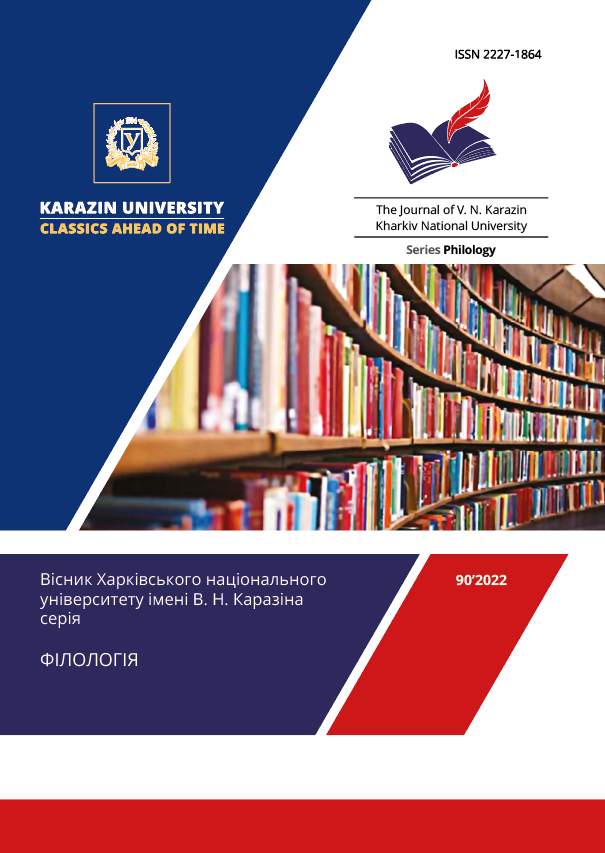Presidential Debate (on the material of the 2020 Election Campaign in the USA)
Abstract
The paper in question is devoted to the study of political debates which are held during the presidential election campaign, based on the first debate between the Republican nominee D. Trump and the Democratic nominee J. Biden in the USA.
The above mentioned phenomenon is studied from the standpoint of communicative linguistics. During political communication the debate in its classical meaning tends to such a form of controversy as polemics, in which the main efforts of the debaters are focused on the asserting their views on the issue under discussion rather than seeking consensus. Presidential debate has the features of the conflict discourse.
The debaters compete for the electorate sympathy, with the main goal being to win power. The communicants’ intention to defeat the opponent and to get the votes determines the optimal way to implement it. The candidates exploit two principal communicative strategies, namely to create and maintain a positive self-image, as well as to discredit the opponent. To realize the first strategy the following tactics are used: positive presenting of the situation, self-praising, promising, and denying the allegation. The tactics of blackening of the competitor, accusing the opponent, insulting and threatening the other debater are effective to implement the second strategy.
The analysis of the US presidential debate dated September 29, 2020 has revealed that the choice of tactics primarily depends on the following parameters: 1) the topic under discussion, 2) the official status of the debater (it is crucial whether the participant of the event is the incumbent or not), 3) the political past of the candidate.
During the debate under consideration both nominees were vulnerable to criticism, as D. Trump was the incumbent president and J. Biden had a long track record, including his serving as the vice-president under B. Obama (2009–2017). The attempts of both parties to evade direct questions of the moderator and to destabilize the opponent’s emotional state with the help of verbal aggression were observed.
Downloads
References
Orators`ke my`stecztvo (2011) / ed. by I. M. Plotny`cz`ka, O. P. Levchenko. Kyiv: NADU. 128 p.
Pasternak, T. A. (2013). Komunikaty`vna strategiya yak konsty`tuty`vna xaraktery`sty`ka dy`skursu. Naukovi zapy`sky` Ostroz`koyi akademiyi. Seriya “Filologichna”. Ostrog, 38, 215–217.
Polity`chna abetka (2010) / ed. by O. V. Radchenko. Kharkiv: “DokNaukDerzhUpr”. 328 p.
Politologichna ency`klopediya (2016) / ed. by A. O. Karasevy`ch, L. S. Shachkovs`ka. Uman`: FOP Zhovty`j O.O. Vol. 5. 710 p.
Politologichny`j slovny`k (2005) / ed. by M. F. Golovaty`j, O. V. Antonyuk. Kyiv: MAUP. 792 p.
Formanova, S. V. (2017). Scenarij “svarka” v aspekti konfliktnogo dy`skursu. Zapy`sky` z ukrayins`kogo movoznavstva, 42(2), 139–148.
Artym, K. Verbalization of communicative strategies and tactics in the speech genre of parliamentary debate (based on debates in the House of Commons on March 25, 2013). Computer Sciences and Engineering 2013 (CSE-2013), 21–23 November 2013, Lviv, Ukraine. URL: http://ena.lp.edu.ua/bitstream/ntb/23811/1/88-242-247.pdf.
Boussalis, C., Coan, T. G. (2021). Facing the Electorate: Computational Approaches to the Study of Nonverbal Communication and Voter Impression Formation. Abstract. Political Communication, 38: 1–2. URL: https://www.tandfonline.com/doi/abs/10.1080/10584609.2020.1784327. DOI: https://doi.org/10.1080/10584609.2020.1784327
Debate. Academic. URL: https://terms_en.en-academic.com/11383/debate.
Donald Trump & Joe Biden 1st Presidential Debate Transcript 2020. URL: https://www.rev.com/blog/transcripts/donald-trump-joe-biden-1st-presidential-debate-transcript-2020.
Eristic. Merriam-Webster Dictionary. URL: https://www.merriam-webster.com/dictionary/eristic.
Jerry, C. Five things to listen for during a presidential debate. National Museum of American History. URL: https://americanhistory.si.edu/blog/five-things-presidential-debate.
Kearns, J. (2011). Strategies. Routledge Encyclopedia of Translation Studies / ed. by M. Baker and G. Saldanha. 2nd edition. London and New York, 282–285.
Paul Grice. Stanford Encyclopedia of Philosophy. URL: https://plato.stanford.edu/entries/grice/.
Polemics. Merriam-Webster Dictionary. URL: https://www.merriam-webster.com/dictionary/polemics.




